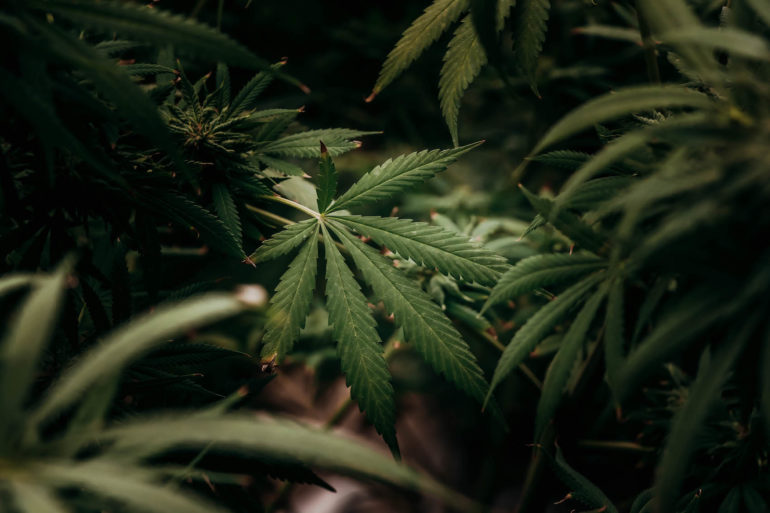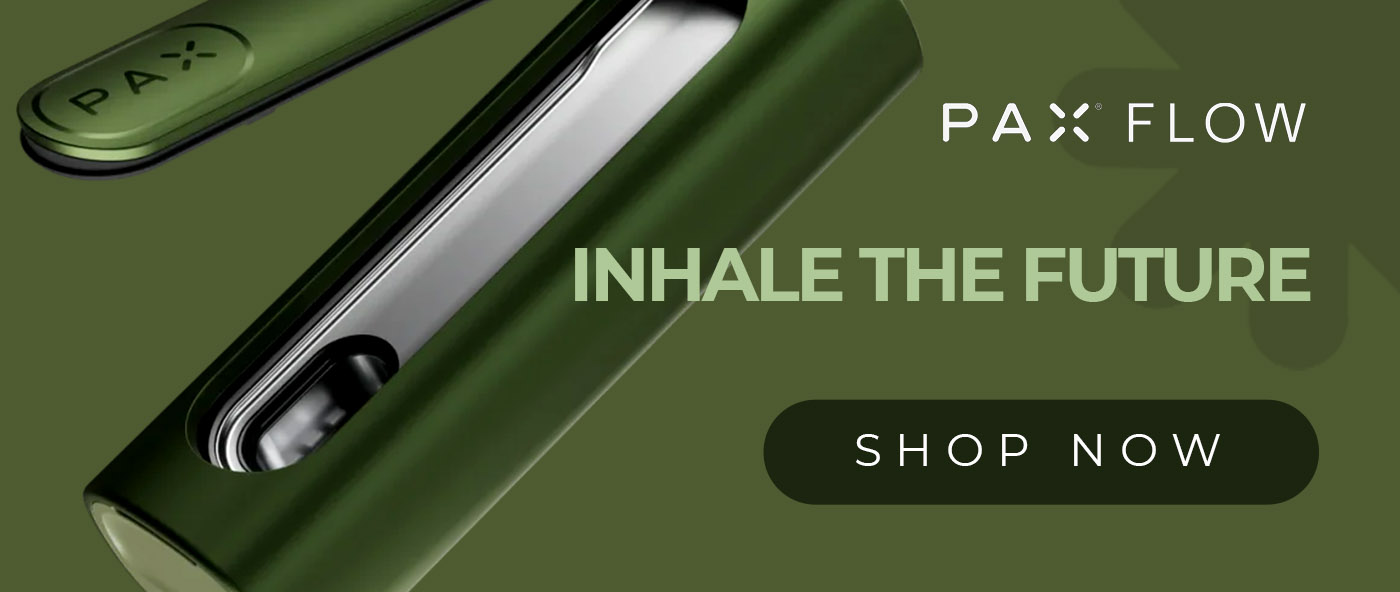The ban on delta-8 THC in Texas is in force, whether you know it or not.
Back in January, a document was quietly added to the Texas Register, completely unsearchable (since it was uploaded as an image), that declared delta-8 to be a Schedule I Controlled Substance.
With no true public hearing and no information provided in advance to stakeholders, this decision has become a very controversial one, and Hometown Hero is pursuing legal action against the Department of State Health Services as a result.
But is the ban going to stand? What does it mean for stores selling delta-8 THC? And how will this affect consumers?
Everything you need to know:
- After importing the 2018 Farm Bill and its definitions into Texas law, the DSHS decided to file an objection to the DEA’s interim final rule based on the Farm Bill.
- The DSHS held a public hearing on the issue that lasted just six minutes because the public and industry stakeholders were not informed, and as a result nobody showed up.
- DSHS Commissioner Hellerstedt confirmed that the DEA’s changes had not been adopted, giving very little in the way of explanation and offering no alternatives.
- The ban officially went into force on January 20th, 2021, when the Texas Register was updated with an updated list of Controlled Substances, which included delta-8.
- After hearing of this for the first time in May that year, Hometown Hero and other companies are fighting the change in the courts, requesting a temporary restraining order (TRO).
- In October, the TRO request was denied, but an appeal hearing is scheduled for November 5th.
- The ban is without justification, threatening to cost the state at least $3.4 million in tax revenue and costing businesses over $50 million.
- Customers surveyed by CBD Oracle have stated that they would switch to black market marijuana and other drugs if the ban was made permanent. The survey also showed widespread opposition to the state’s position.
Delta-8 Legal Battle in Texas: Timeline of Events
Lawmaking takes time, and the story behind the ban on hemp-derived delta-8 THC in Texas has a long history. In their Temporary Restraining Order document, Hometown Hero (Sky Marketing Corp) runs through the timeline in detail to emphasize how poorly this has been handled by the Texas legislature.
Not only does going through the details give you the full picture about what happened, it also shows exactly why Texas-based companies selling delta-8 are so pissed off about how things have been handled.
December 20, 2018: The “Farm Bill” was signed into law. This gave a specific definition of hemp and removed hemp – and THCs derived from hemp – from the controlled substances list, provided the finished product contains less than 0.3% delta-9 THC.
March 15, 2019: The Department of State Health Services (DSHS) removed hemp and the THCs in hemp from the controlled substances list, in line with the Farm Bill.
June 10, 2019: The Texas legislature signed HB 1325 into law, effective immediately. This basically defines hemp as in the Farm Bill, which effectively removes hemp and THCs in hemp from the controlled substances list through legislative action.
August 21, 2020: The DEA publishes the interim final rule (IFR) which made changes to the definitions of THC and “Marihuana extract,” basically removing “hemp” as defined by the Farm Bill from the definitions. There is a lot of confusion surrounding this rule, but it doesn’t add requirements, reschedule or delete anything, merely bringing the DEA’s regulations in line with those of the Farm Bill.
September 18, 2020: The DSHS in Texas filed a Notice of Objection in the Texas Register, taking issue with the changes made by the DEA. They scheduled a public hearing to address the topic. However, given that the DEA didn’t designate, reschedule or delete anything, the Texas Health and Security Code doesn’t allow this to be done. Additionally, no Texas hemp industry stakeholders were made aware the objection was filed.
October 6, 2020: The DSHS had a “public” hearing regarding the objection made on the September 18th. This was held over Zoom, and lasted less than six minutes in total because there was nobody present to comment. This was because no hemp industry stakeholders were made aware of the hearing, and in fact nobody knew it supposedly occurred until May 18th, 2021. The DSHS also didn’t propose any alternative modifications, instead just saying it objected to the current ones.
There was technically a notice posted on the DSHS website (via Wayback Machine), but this wasn’t in a location anyone with a hemp license would think to check and it certainly wasn’t publicized: no stakeholders were aware of the meeting.
November 17, 2020: DSHS Commissioner Hellerstedt signed a decision stating that the two modifications made by the DEA were not adopted. There were still no details or reasoning provided other than that the DSHS objected to the modifications (other than that other THC isomers may have psychoactive properties), and again they didn’t provide any alternatives. Industry stakeholders were still not made aware of these changes, including those with licenses or registrations from the DSHS themselves.
January 20, 2021: A document entitled “Decision Order Regarding the Modification of the Definition of Tetrahydrocannabinols in Schedule I of the Schedules of Controlled Substances” was published in the Texas Register. This simply repeated the Commissioner’s decision of November 17th.
March 19, 2021: Despite regulations stating that any actions taken under the specific section must be published in the Texas Register within 5 business days, almost two months after the previous decision was issued, an image of a modified Schedule of Controlled Substances was published in the register. This image showed significant changes to the definitions of “marihuana extract” and “tetrahydrocannbinol.” However, because it was published as an image rather than a HTML or PDF file, it’s completely unsearchable, and cannot be located by searching the Texas Register using any relevant term. In essence, one has to find the specific change two-thirds of the way through a 90+ page document by manually searching it.
May 18, 2021: At a hearing for the Water, Agriculture and Rural Affairs Committee, a representative from the DSHS discussed the above decision and emphasized that the DSHS considers delta-8 to be a “marihuana extract.” This was a surprise to industry stakeholders and members of the public, because the previously-mentioned decisions, hearings and alterations had effectively occurred in secret. The documents were only discovered as a direct result of this appearance. The hearing was on a bill that would have banned some consumable hemp products that contain alternative forms of THC.
May 30, 2021: A bill (HB 2593) originally aiming to reduce penalties for possession of THC concentrates was rendered dead despite receiving broad support in its original form. However, during the Senate floor debate, an amendment was added that would have severely impacted the delta-8 market. This was removed by a conference committee and approved by the House, but Lt. Gov. Dan Patrick took no action on the bill and essentially killed it in the process.
May 30, 2021: The 87th Legislative Session ended. This session had included multiple attempts to ban hemp containing forms of THC beyond the maximum 0.3% limit on delta-9 from the Farm Bill, but all of these attempts failed. Industry stakeholders and consumers assumed that as a result of this, their products would remain legal.
September 1, 2021: HB 1535 went into effect, which expands the conditions eligible for medical cannabis in Texas. There is speculation that this bill is related to the delta-8 ban, because it’s essentially a competing product.
September 14, 2021: CDC releases a health warning about delta-8 THC. This likely influenced policy decisions around the ban.
October 15, 2021: The DSHS updated its website to label delta-8 as a Schedule I controlled substance. This was again done without notifying stakeholders or the public, leaving many stores literally selling what is considered a schedule I controlled substance without being aware of the fact.
October 18, 2021: CBD and vape stores pull delta-8 products off the shelves. Some stores, such as some in Dallas, keep the products on the shelves, and some are raided by the police as a result.
October 20, 2021: Hometown Hero and other companies sue the state to put a temporary restraining order (TRO) on the ban, essentially putting forward the arguments contained within this post.
October 25, 2021: The TRO request was denied, with the judge stating that “Based upon the pleadings and arguments of counsel, the Court finds that Plaintiff has not met the requirements of a temporary restraining order.”
November 5, 2021: Remote hearing on the TRO. Hometown Hero will present their case to the judge. It is expected to cost $500k to $600k, and Hometown Hero is asking companies to pitch in to help with the legal costs, and add their voices and insights to the case (contact [email protected] to get involved).
November 8, 2021: The court granted Hometown Hero’s application for a temporary injunction. As a result, delta-8 is not classed as a controlled substance and businesses can legally sell hemp-derived delta-8 with less than 0.3% THC. This injunction lasts until the conclusion of the final trial of this case. “The Court hereby enjoins the effectiveness going forward of the rule stated on DSHS’s website that Delta-8 THC in any concentration is considered a Schedule I controlled substance.”
December 10, 2021: The DSHS requested the Texas Supreme Court to hear the case. The request was denied, according to a video released by Hometown Hero. This means that the case Hometown Hero v Texas DSHS stays in the Texas Appellate Court until the case is ruled on in about 6-12 months.
January 28, 2022: The final trial for the Hometown Hero v Texas DSHS case was set for January 2022 but that hearing was canceled and never took place.
March 7, 2022: As of now, there’s no hearing scheduled. According to Hometown Hero, the next court date could take place in roughly 6-18 months (between July 2022 – July 2023). In the meantime, delta-8 remains legal to buy and sell in Texas.
September 28, 2023: Following the case being moved to the 3rd Court of Appeals, the court upheld the injunction against the state, re-affirming that delta-8 THC can be legally sold in Texas.
January 3, 2024: Texas files another petition for review to the Texas Supreme Court.
We spoke to Cynthia Cabrera, Chief Strategy Officer at Hometown Hero in April 2024, who gave us an update on the case, “So we won the appeal in September, and then they had an offer. So basically, what they did was rather than appeal our appeal to the appeals court, because they lost, they went back to the Texas Supreme Court and said, ‘Hey, we want you to throw this out and hear the thing all over again.’ And so that’s what’s happening now. I mean, they could just drop the whole thing.”
She continued, “So it’s our turn now to respond. And obviously our response is going to be, they lost the first time, it was rejected by the Supreme Court once already. Don’t hear this case again. But you never know what’s going to happen. So we do have to [respond], it’s not like we can ignore it, you know?”
Hometown Hero has to respond before the end of April.
FAQs
Is Delta-8 THC Currently Legal in Texas?
Updated: On November 8th, the court granted a temporary injunction to Hometown Hero which prohibits the previous ban put into place by the DSHS. As of now, delta-8 is legal to buy and sell in Texas.
For the reasons discussed above, this is difficult to answer. Texas Hemp Growers, for example, says it is not based on the DSHS statement on the same question (as detailed above). However, the Texas Hemp Federation claims it is legal essentially based on the reasoning from the TRO outlined above.
The most prudent answer – based on the actions taken by law enforcement and the published list of Controlled Substances in the Texas Register – is that it is not legal. However, this is pending the result of the legal challenges and it is reasonably clear that this action has not gone through the usual legal channels, in particular obvious from the failed attempt to enact strict regulations through HB 2593.
When Does This Ban Take Effect?
It has already taken effect, on January 20th, 2021. This is certainly unfair, but pending the legal challenge, this is the law.
Is Delta-8 Legal If It Has Less Than 0.3% Delta-9 THC?
The answer here is the same as above. Unfortunately the Texas DSHS is taking the hard-line view that it is not legal regardless of the delta-9 content of the product, despite the contents of the Farm Bill.
What’s the Penalty If I’m Caught With Delta-8?
If you’re caught with delta-8, it would be considered a felony. This carries a penalty of up to two years in prison and up to $10,000 in fines, with hemp licensees losing their license and their ability to obtain one for at least 10 years.
Where Is This Mentioned in the Law?
The Controlled Substances list is here, and the DSHS gets their authority to modify the list from here. This isn’t exactly easy to read, but the updated Controlled Substances list does include delta-8 in the form of a vague statement about “marihuana extracts.”
Wasn’t a Delta-8 Ban Defeated in the Legislature?
Yes, but the DSHS had basically already listed delta-8 as a controlled substance. This is confusing – and as discussed above, possibly illegitimate – but the attempt at a ban was basically unnecessary because they had already secretly made the required changes.
When Did This Change Happen?
The official date for the change was January 20th, 2021, when the change was published on the Texas Register. This, of course, wasn’t adequately publicized and products were sold “illegally” for many, many months after this date.
Can States Pass More Strict Laws on Hemp Products Than the Federal Government?
The Farm Bill explicitly mentions that states are allowed to pass more stringent rules than the federal government. So provided the legal challenge fails, Texas’ stance is totally fine with the federal government.
Is It Legal to Have Delta-8 THC Sprayed on Hemp Flower?
Spraying the delta-8 onto flower has no impact on the debate here – the argument is not about whether some forms of delta-8 are legal, it’s whether any delta-8 is legal.
What About Delta-8 Gummies and Edibles?
Again, the form of the delta-8 doesn’t matter: it is officially considered a felony at present.
Does This Apply to THCP, THCO, THCV, HHC and Other Cannabinoids Too?
Yes, provided the changes withstand the legal challenge from Hometown Hero and others, all designer cannabinoids are covered.
How Should I Get Rid of My Current Inventory?
While the official line – and that taken by Texas Hemp Growers – is that it’s now illegal and you shouldn’t even possess it, this is not realistic for a business with a large stock of a product they believed to be legal. Based on interviews conducted by CBD Oracle, many stores are choosing to sell online to legal states or even setting up pop-up stores there to clear their stock legally.
Does the DSHS Enforce Its Rules?
The DSHS doesn’t enforce the rules personally, but the police, sheriffs and the Department of Public Safety do enforce them. This doesn’t mean you will be caught but you definitely could be.
Who Should I Contact to Fight This?
You can contact DSHS Commissioner John Hellerstedt at [email protected], and you can also join or support the legal challenge by contacting [email protected]. Beyond this, you can contact the governor.
RELATED: Where is Delta-8 THC Legal? (Map of States)
Does the DSHS Have the Authority to Ban Delta-8 THC?
The DSHS does not have the authority. As stated on their website: “Complaints regarding controlled substances should be referred to law enforcement. DSHS has no regulatory authority over controlled substances.”
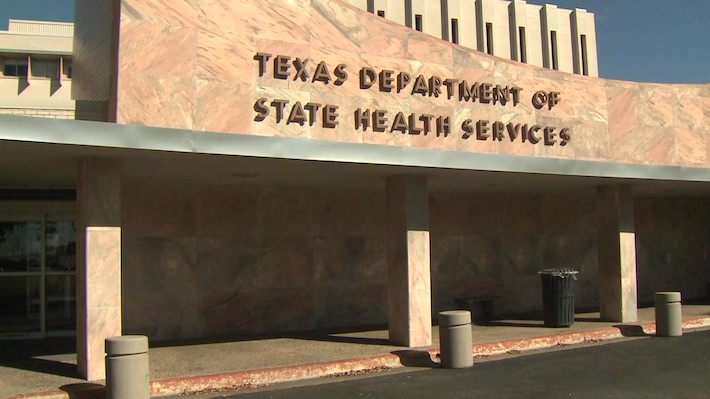
However, as is clear from the timeline above in particular, the DSHS has taken it on itself to object to the DEA adopting the federal-level Farm Bill, and then used that objection as a justification for updating the list of controlled substances in Texas law. In turn, the police are now using this to justify raiding stores and seizing products.
Stores looking to fight back against this are unfortunately in a difficult position. While the way Texas has approached the issue leaves a lot to be desired and the legal challenges are underway, there is little else that can be done other than support those challenges. Continuing to sell delta-8 THC products in Texas is unwise unless the changes are overturned. If you have stock you want to sell, the best approach is to sell it in a legal state, whether directly or online.
Why Did DSHS Issue the Ban?
The reasoning given behind classing delta-8 THC (and other cannabinoids – other than THC in less than 0.3% concentration) as a controlled substance is essentially that other cannabinoids can have pharmacological and psychoactive properties.
As much as this isn’t sufficient justification for the action they’ve taken, from a prohibitionist mindset this is a fairly reasonable explanation.
It’s true that delta-8 THC is psychoactive, and if your goal is to stop access to psychoactive substances (and you’ve ignored the entire history of the war on drugs) then banning it would make sense.
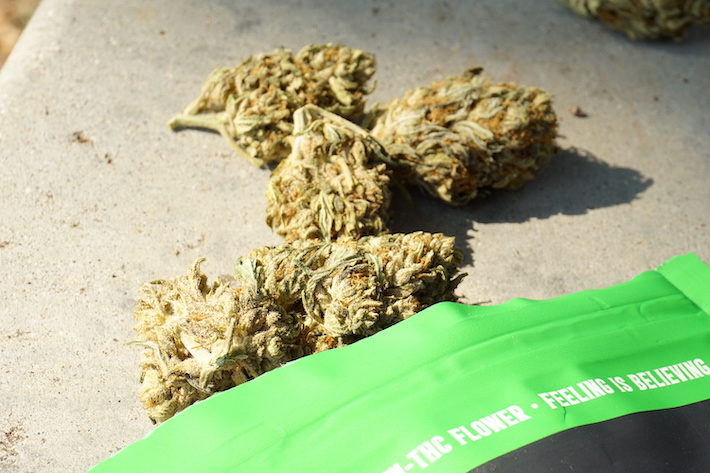
The response from the DSHS to Hometown Hero’s lawsuit gives “justification” but in a willfully ignorant and kind of catty way:
“[The] plaintiff’s alleged surprise that tetrahydrocannabinol (THC) remains a Schedule I controlled substance does not merit the extraordinary relief of a temporary restraining order. THC, including Delta-8 tetrahydrocannabinol (Delta-8), has been a Schedule I controlled substance in Texas for over 40 years.”
Of course this glosses over the key issue: delta-9 THC is the “THC” that has been referred to in law up until very recently. Delta-8 is not delta-9, and so a ban on delta-9 does not constitute a ban on delta-8. This is the whole point of the discussion. Of course you can make an argument that they are analogues and therefore delta-8 is included by the Federal Analogue Act, but that is a whole separate discussion.
The industry and interested consumers have raised several issues with the DSHS’s handling of the issue, most notably the lack of notice prior to the announcement and the near-complete lack of notice of the public hearing (evidenced by nobody showing up) that could have enabled companies to fight the change.
They also provided zero guidance for stores needing to clear their existing inventory, and there was no grace period or even advanced notice for them to prepare. On top of this, the ban is totally unjustified in itself, as Rick Trojan III from the Hemp Industries Association commented:
“This is really out of nowhere. It’s not based on science, it’s not based on any real threat to Texans.”
Additionally, delta-8 is not synthetic because it is produced naturally by hemp and in ordinary cannabis plants, and it’s fairly clear that the Farm Bill does allow it if produced from a hemp source. There are many reasons people are unhappy about what’s happening.
Why Are Companies Filing Lawsuits?
The reasons companies are filing lawsuits have been explained throughout this post, but seeing them collected together can be very useful in understanding the precise issues people are having.
Overall, the lawsuits relate to the DSHS’s poor adherence to procedures that are in place for making such changes. Firstly, the changes were initiated in response to the DEA issuing the IFR, where the DSHS issued a Notice of Objection. However, since the DEA didn’t reschedule, delete or designate anything, they were not actually able to do this under Texas law.
In addition, the section of the Texas Health & Safety Code under which they filed the objection (Chapter 481) states that any changes made under it must be published in the Texas Register within 5 business days. It took them over two months to do this.
The changes to the Schedules were also not made in a way that followed the law. In particular, while they did technically have information up on their website about the public hearing, no stakeholders were informed and the notification was published in an obscure location on the DSHS website. The issues with this are evident from the fact that nobody actually attended the meeting, despite a large number of businesses having a vested interest in the issue.
The DSHS also failed to notify the public of the changes it had made to the Schedules. This is made worse by the fact that the modifications were essentially made in secret, published as an image which therefore couldn’t be searched or even located with logical keywords.
Finally, the overarching point is that the Farm Bill – and the alterations made to Texas law in order to be compliant with it – defines “hemp” in a way that implicitly includes delta-8, so it should be legal under that legislation. State governments can enact stricter rules, but the process for doing so was not followed and the legitimate legislative attempts that were made did not pass through the system.
Local Business Impact of the Delta-8 Ban
The impact of the ban on local business is also difficult to overstate. According to Texas Hemp Growers, delta-8 is a $51.4 million annual market in Texas, bringing in $3.4 million in sales tax each year. This alone raises major questions for the ban: what is the benefit that would outweigh $3.4 million in tax dollars?
There are over 227 licensed retailers and over 2,000 unlicensed smoke or vape stores selling delta-8. CBD Oracle interviewed over 20 stores, who stated that 60% of their business was selling delta-8 THC products, underlining the huge impact this law would have on legitimate businesses in the state. It is their most popular product by a substantial margin.
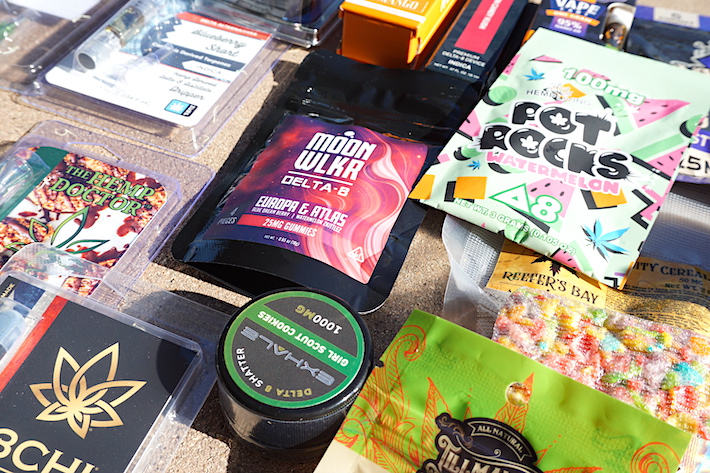
The issue with the lost tax revenue is made even worse by the finding from these interviews that most stores support regulation, and would even be willing to pay additional taxes to keep the products legal. The potential for the state to profit from common-sense regulation is huge, and as well as taking this tax revenue away, they are crippling the businesses that sell delta-8.
With the current situation, stores are currently sitting on millions of dollars worth of stock that they cannot legally sell. Some even plan to set up pop-up venues in legal states – representing lost tax revenue for Texas – or sell to them online.
Finally, it is estimated that 9,000 people work in CBD and smoke shops across Texas. If the stores are unable to sell delta-8, it will hugely impact their bottom line and likely lead to thousands of people losing their job. Again, the benefit of doing this is far from clear, but the downsides are real and present.
Consumer Impact of the Delta-8 Ban
87% of Texans support some form of cannabis legalization, and CBD Oracle’s survey of 500 adults in Texas who have heard of delta-8 found that 94% of them oppose the ban currently instituted by the state.
Delta-8 is like delta-9 except milder, and this makes it a great choice for people looking for natural medicine who have side effects from delta-9 heavy cannabis.
Removing delta-8, completely against consumer wishes, means that these people have no choice but to either risk side effects or find some alternative medication.

Our survey also addressed what people would do if the ban was permanent. We found that about a third of respondents would switch to black market marijuana as an alternative, and more concerning, around one in six said they would switch to harsher drugs.
Both of these were particularly big risks for younger adults (aged 25 to 34) and men. Additionally, 31.6% of those surveyed said they would switch to prescription medication and opioids.
The problem – as always – is that prohibition encourages the black market. In the same way home-made moonshine rose to prominence during alcohol prohibition, so black market cannabis products thrive during cannabis prohibition. The solution is simple: keep it legal and regulate the market.
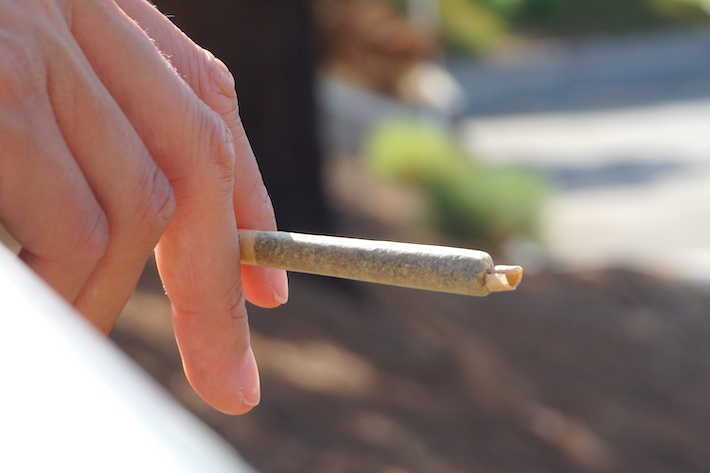
There are many different ways to approach regulation, but any approach is better than an outright ban. Texas could regulate delta-8 THC in a similar way to hemp, or alternatively, use an approach like adult use states have with marijuana.
Both of these options have positives and negatives, but both allow continued access for those who need it, generate tax revenue and protect consumers from poorly-made products.
A Cautionary Tale: The Smokable Hemp Ban in Texas
The proposed delta-8 THC ban shares many characteristics with the smokable hemp ban attempted by the DSHS last year. The timeline of events makes for very familiar reading to anyone familiar with the contents of this post so far:
- June 2019: HB 1325 was signed into law. This allowed the cultivation of hemp and the manufacture of consumable hemp products in Texas, but prohibited processing and manufacture of hemp products intended for smoking.
- August 2020: The DSHS issued rules regarding the manufacture and sale of hemp products (including CBD) in Texas, which went further than HB 1325 in that it also outlawed the distribution and sale of hemp products for smoking, even if they were produced out of state.
- August 2020: Crown Distributing LLC sued the DSHS, challenging both aspects of the restrictions on hemp products for smoking (i.e. the ban on manufacturing and sales).
- September 2020: They obtained a temporary injunction against the state, preventing enforcement of the ban.
- June 2021: A judge hears a petition from DSHS that requested dissolution of the injunction.
- August 3, 2021: The Third District Court of Appeals ruled the distribution and retail sale ban to be unlawful, but reversed the injunction against the manufacturing and processing aspects of the ban.
- August 23, 2021: The 261st Civil District Court ruled that the proposed regulations went against the Texas constitution. The judge called it “invalid in its entirety,” thus granting a permanent injunction against the ban.
The similarities are clear: the DSHS took issue with aspects of the 2018 Farm Bill and went above and beyond its jurisdiction in an attempt to squash the parts of the industry it didn’t like.
However, through a concerted legal effort and many contributions to the Texas Hemp Legal Defense Fund in order to be defeated. The laws aren’t exactly easy to overcome, but the main lesson we can learn is that the DSHS has overstepped its bounds before and it is possible to bring the industry justice in the courts.
Conclusion
The DSHS ban on delta-8 THC is unlawful. Not only does it contradict the definitions and federal-level rules from the Farm Bill (which has been written into law in Texas), but it also was instituted in a decidedly underhanded and secretive fashion.
Stakeholders or the public were not adequately made aware of the changes, there was a farcical “public” hearing with precisely zero members of the public in attendance, and the changes to the Schedules weren’t even made in a way that could have been reasonably found by interested parties.
The legal battle may still be ongoing, but looking through the timeline of events and the lackluster responses from the DSHS, it is one that it’s very possible to win.
Editor’s note: We updated this article on April 15, 2024, to include comments from Cynthia Cabrera, Chief Strategy Officer at Hometown Hero, who gave us an update on the case.
